Published Papers
Alessi, A., Cojoianu, T.F., Hoepner, A.G.F., Michelon, G. 2024. Special Issue Editorial: Accounting for the EU Green Taxonomy: Exploring its Concept, Data and Analytics. Accounting Forum. 10.1080/01559982.2024.2369343
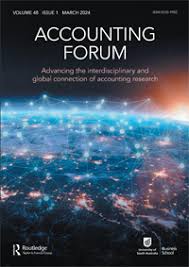

This Special Forum highlights that accounting for green economic activities is an essential enabler for policymakers, investors, companies, scientists and other stakeholders to gain a nuanced understanding on the most effective ways to transition to a net zero carbon economy in a timely manner. The EU is at the forefront of efforts with legislative developments such as the Taxonomy regulation, the Corporate Sustainability Due Diligence Directive (CSDDD), the Corporate Sustainability Reporting Directive (CSRD), Climate Transition Benchmarks (CTBs), Paris-Aligned Benchmarks (PABs) and the regulation on sustainability-related disclosures in the financial services sector (SFDR). Against this regulatory background, the Special Forum focuses specifically on the EU Taxonomy, a classification system that defines criteria for economic activities that are, in combination with economy wide decarbonization, supportive of a net zero trajectory by 2050 and of meeting broader environmental goals on biodiversity, circular economy, pollution prevention and water.
Cojoianu, T.F, Hoepner, A.G.F., Hu, X., Ramadan, M., Veneri, P., Wojcik, D. 2024. Are Cities Venturing Green? A Global Analysis on the Impact of Green Entrepreneurship Urban Centres on Air Quality. Business Economics, 62(2), 523-540. https://doi.org/10.1007/s11187-023-00764-4
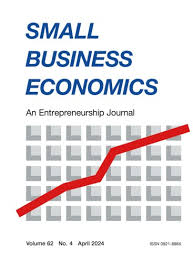

Situated at the intersection between environmental entrepreneurship and urban sustainability, our paper seeks to investigate the links between city-level green venture ecosystems and the ability of urban centres to reduce air pollution. Using a large dataset of 12,834 urban centres from around the world and their associated yearly average particulate matter (PM2.5), we show that an increase in the cumulative number of green start-ups drives the lowering of PM2.5 levels. Looking closely at the subsectors that drive the results, we observe that the urban centres which hosted increased numbers of innovators in smart grid technologies, energy efficiency and wind energy generation (the low carbon energy sector overall) also experienced a decrease in air pollution over the 2010–2019 period. Thus, our study is a global analysis of the environmental impact of green entrepreneurship on local air pollution.
Caragea, D., Cojoianu, T.F., Dobri, M., Hoepner, A. G. F., Peia,O. 2024. Competition and innovation in the financial sector: evidence from the rise of FinTech start-ups. Journal of Financial Services Research 65(1), 103-140. https://doi.org/10.1007/s10693-023-00413-7
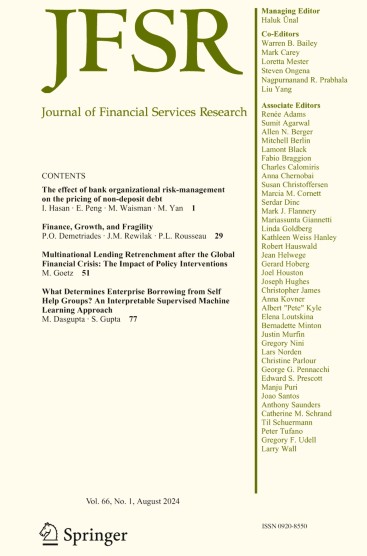

This paper provides new evidence on the effects of entry on incumbents’ incentives to innovate by examining the rise of FinTech innovations over the period 2000-2016. We employ machine learning algorithms to classify a large sample of patent applications into five types of FinTech innovations. We then show that greater competition from innovators outside the financial sector increases the probability that incumbent financial firms will innovate. Our identification strategy exploits the variation over time in the share of FinTech patent applications by non-financial start-ups relative to incumbent financial firms, as a proxy for competitive pressures from outside the financial industry. We also find that this increased competition results in a higher number of FinTech patent applications by financial incumbents relative to non-financial ones, especially when the FinTech innovations are more important, as proxied by the number of their future patent citations.
Alessi, L., Cojoianu, T.F., French, D., Hoepner, A.G.F. 2023. Special issues in support of evidence-based policy making in sustainable banking & finance. International Review of Financial Analysis, 102818. https://doi.org/10.1016/j.irfa.2023.102818
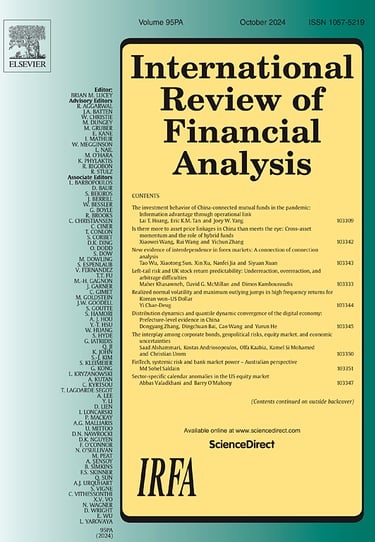

There is little doubt that the sustainable finance policy agenda globally has been spearheaded by the EU Commission, in particular by requiring financial product disclosures on the transparency of the promotion of environmental or social characteristics (Article 8 of the Sustainable Finance Disclosure Regulation - SFDR) or the transparency of sustainable investments in pre-contractual disclosure (Article 9 of SFDR), as well as the transparency of adverse sustainability impacts and their continuous monitoring (Article 4 of SFDR). This self-disclosure regulation has already had a substantial impact on the global financial industry, as it has brought to the surface one of the biggest greenwashing scandals where the large asset manager DWS has had to reduce its claim of assets managed under ESG criteria by over 75%. SFDR deals with three crucial elements: first, it aims to foster transparency through mandatory self-disclosure, secondly, it makes a clear distinction between financial products that merely integrate environmental, social, and governance characteristics in their investment process and those products which actively seek to deliver an impact in the real world. Thirdly, it gives a strong recourse against potential greenwashing as its principal adverse impact indicators will be a key yardstick on whether a financial product achieves its sustainability aims or not, particularly in the context of secondary financial markets. In this light, the special issue seeks to inform policymakers with timely insights on sustainability disclosure, practical ESG integration aspects in investment decision-making, and different aspects of impact investing. Finally, this editorial presents a conceptual framework on how climate change mitigation-related greenwashing could be analyzed.
Cojoianu, T. F., Hoepner, A. G., & Lin, Y. (2022). Private market impact investing firms: Ownership structure and investment style. International Review of Financial Analysis, 84, 102374. https://doi.org/10.1016/j.irfa.2022.102374


Impact investing and ESG investing are specific “ethical” investing types integrating social, environmental, and moral values with financial goals. Despite receiving heightened scholarly attention, the difference between impact and ESG investing is largely unexamined, and it is not clear how they differ from conventional investment. To explain the differences between ESG, impact, and conventional investing, this paper draws on a dataset of over 8000 private market investment (PMI) firms. It compares impact, ESG, and conventional investment across firm characteristics, investment preference, and ownership. Results show that impact investors are more likely to be owned by the government, focusing on agriculture, cleantech, and education while avoiding “sin” industries like gambling and tobacco.
Collaço de Carvalho, S.H., Cojoianu, T.F., Ascui, F. 2022. From impacts to dependencies: A first global assessment of corporate biodiversity risk exposure and responses. Business Strategy and the Environment https://doi.org/10.1002/bse.3142
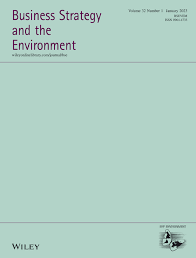

There is growing awareness that biodiversity loss poses a significant risk to the global economy, but a lack of clarity on what this means for corporations, and how they are responding. This study provides a first quantitative assessment of biodiversity risk exposure across the world's largest listed companies, compared with their adoption of biodiversity policies, through analysis of disclosures from a sample of 11,812 companies from 2004 to 2018. We find that companies have started responding strategically to biodiversity risk, with 29% having adopted a biodiversity policy by 2018. However, around $7.2 trillion of total enterprise value remains exposed to unmanaged biodiversity risk. Companies in sectors with material impacts on biodiversity tend to have high levels of response, but there is poorer responsiveness to material biodiversity dependency risks. A natural-capital-based view (NCBV) of the firm is proposed to theorise how corporations are constrained by both their impacts and dependencies on natural capital.
Cojoianu, T.F., Hoepner, A.G.F., Schneider, F.I., Urban, M., Vu, A., Wojcik, D. 2021. The city never sleeps: but when will investment banks wake up to the climate crisis? Regional Studies. https://doi.org/10.1080/00343404.2021.1995601
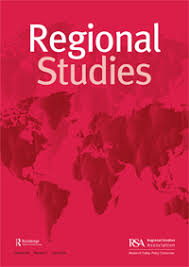

Using a global dataset of over 840,000 equity, bond and syndicated loan investment banking deals, we build the fossil fuel investment brokerage profile of financial centres worldwide between 2000 and 2018. We also study whether city-level fossil fuel divestment commitments and country-level green banking policies impact the profile of fossil fuel financial centres over our study timeframe. We find that several financial centres shift their fossil fuel investment brokerage profiles substantially, including the asset classes in which they are active. However, we do not find any evidence that this is driven by city-level divestment commitments. In contrast, we find that fossil fuel investment banking brokers situated in financial centres exposed to voluntary green banking policies reduce their fossil fuel financing. This is driven by foreign brokers whose behaviour appears to signal an anticipation of forthcoming mandatory green finance policies.
Cojoianu, T., Ascui, F., Clark, G., Hoepner, A., & Wojcik, D. 2021. Does the Fossil Fuel Divestment Movement Impact New Oil & Gas Fundraising? Journal of Economic Geography. https://doi.org/10.1093/jeg/lbaa027
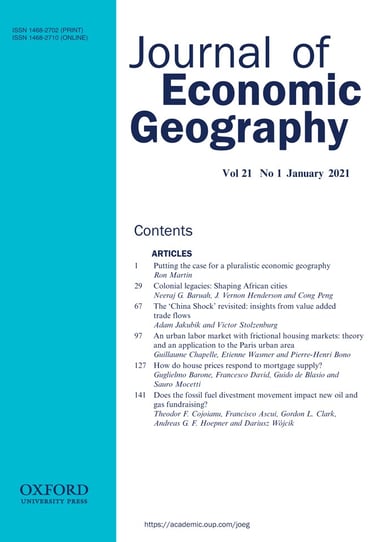

This article explores whether increasing fossil fuel divestment commitments are related to the reduction of capital flows into the oil and gas sector, based on an analysis of syndicated lending, equity and bond underwriting across 33 countries from 2000 to 2015. We find that increasing oil and gas divestment pledges in a country are associated with lower capital flows to domestic oil and gas companies. This effect is enhanced in more stringent environmental policy regimes and diminished in countries which heavily subsidise fossil fuels. However, the divestment movement may have an unintended effect, insofar as domestic banks situated in countries with high divestment commitments and stringent environmental policies provide more finance to oil and gas companies abroad. We explain these findings through the lens of institutional theory and show how both regulatory and socially normative elements of institutions shape this dynamic.
Caragea, D., Chen, M., Cojoianu, T.F. , Dobri, M., Glandt, K., Mihaila, G. 2020. BERT-based Models for Identifying FinTech Innovations. IEEE BigData 2020. 10.1109/BigData50022.2020.9378169


Advancements in technology have resulted in the emergence of numerous FinTech innovations. However, a global understanding of such innovations is limited, due to a lack of an underlying taxonomy and benchmark datasets in the FinTech domain. To address this limitation, we develop a FinTech taxonomy and manually annotate a set of FinTech patent abstracts according to the taxonomy. We use the annotated dataset to train deep learning models, specifically recurrent neural networks and convolutional neural networks combined with state-of-the-art BERT transformers. Experimental results show that the deep learning models can accurately identify FinTech innovations. We use our best performing BERT-based model on a large dataset of financial patent abstracts, and shortlist a set of 25,580 FinTech patent applications submitted to the European and US Patent Offices between 2000 and 2017. We illustrate how an analysis of the shortlisted set can be used to gain understanding of what FinTech innovations are, where and when they emerge, and provide the basis for further work on what their impact is on the companies investing in them, and ultimately on society.
Cojoianu, T.F., Collins, E., Hoepner, A.G.F., Magill, D., O’Neill, T., Schneider, F. 2020. In the Name of COVID-19: Is the ECB Fuelling the Climate Crisis?
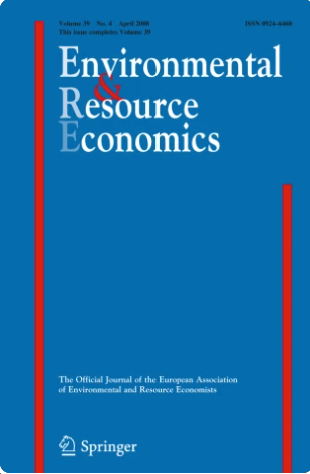

We offer preliminary evidence drawing on a novel dataset of corporate bonds issued in the European energy sector since January 2020 in combination with the European Central Bank's (ECB) purchases under the Pandemic Emergency Purchase Programme (PEPP) in response to COVID-19. We show that the likelihood of a European energy company bond to be bought as part of the ECB's programme increases with the greenhouse gas (GHG) intensity of the bond issuing firm. We also find weaker evidence that the ECB's PEPP portfolio during the pandemic is likely to become tilted towards companies with anti-climate lobbying activities and companies with less transparent GHG emissions disclosure. Our findings imply that, at later stages of the COVID-19 recovery, an in-depth analysis may be necessary to understand if, and if yes why, the ECB fuelled the climate crisis.
Cojoianu, T. F.; Clark, G.; Hoepner, A. G. F.; Veneri, P. and Wojcik, D. 2020. Entrepreneurs for a Low Carbon World: how Environmental Knowledge and Policy Shape the Creation and Financing of Green Start-Ups. Research Policy. https://doi.org/10.1016/j.respol.2020.103988
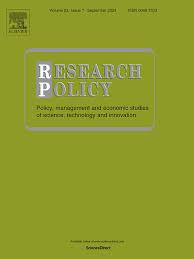

We investigate how different types of environmental policies and new regional environmental knowledge affect new venture creation in and financing of green (low carbon), brown (fossil fuel) and gray (unrelated to natural resources) technologies across 24 OECD countries and 293 regions over the period 2001-13. We find that new regional environmental knowledge positively impacts new venture creation in green technologies, and moderately in gray industries. Gray industries also benefit from enhanced start-up financing in regions where new environmental knowledge is created, confirming that environmental knowledge creation yields positive externalities beyond the green sector. We also find that a more stringent environmental policy regime negatively impacts the creation of new ventures across sectors, but most prominently, it discourages new fossil fuel ventures. However, once entrepreneurs decide to start a new business, stringent environmental policies have on aggregate a positive effect on new venture financing across sectors, particularly through feed-in-tariffs and emission standards.
Cojoianu, T. F., Clark, G. L., Hoepner, A. G., Pažitka, V., & Wójcik, D. (2021). Fin vs. tech: are trust and knowledge creation key ingredients in fintech start-up emergence and financing?. Small Business Economics, 57, 1715-1731. https://doi.org/10.1007/s11187-020-00367-3


We investigate how the emergence of fintech start-ups and their financing is shaped by regional knowledge creation and lack of trust in financial services incumbents across 21 OECD countries, 226 regions and over the 2007–2014 period. We find that knowledge generated in the IT sector is much more salient for fostering new fintech start-ups than knowledge generated in the financial services sector. Additionally, the importance of new knowledge created in the financial services sector (IT sector) increases (decreases) as fintech start-ups grow and seek financing. When the level of trust in financial services incumbents falls within a region, this is followed by an increase in the financing provided to fintech start-ups. Nevertheless, regions with historically low average levels of trust in financial services incumbents attract less fintech investment overall.
Ascui, F., Cojoianu, T.F. 2019. Implementing natural capital credit risk assessment in agricultural lending. Business Strategy and the Environment. DOI:10.1002/bse.2313.


Agriculture has critical impacts and dependencies on natural capital, and agricultural lenders are therefore exposed to natural capital credit risk through their loans to farmers. Currently, however, lenders lack any detailed guidance for assessing natural capital credit risk in agriculture and are challenged by the fact that the relevant material risks vary considerably by agricultural sector and geography. This paper develops a natural capital credit risk assessment framework based on a bottom-up review of the material risks associated with natural capital impacts and dependencies for Australian beef production. It demonstrates that implementing natural capital credit risk assessment is feasible in agricultural lending, using a combination of quantitative and qualitative inputs. Implementation challenges include the complexity and interconnectedness of natural capital processes, data availability and cost, spatial data analytical capacity, and the need for transformational change, both within lending organisations and across the banking sector.
Wójcik, D. and Cojoianu, T.F. 2018. Resilience of the US securities industry to the global financial crisis. Geoforum, 91, pp.182-194. https://doi.org/10.1016/j.geoforum.2018.02.035
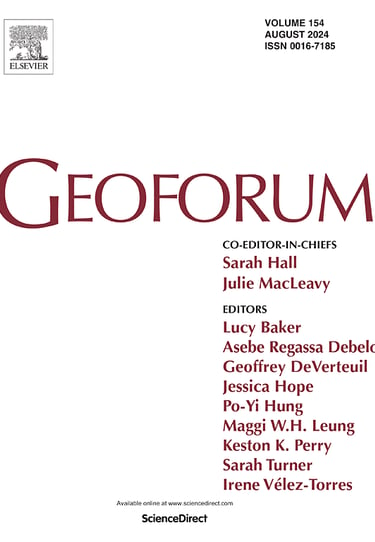

The global financial crisis was underpinned by the securitization of subprime mortgages led by US investment banks, and its outbreak was marked by the bankruptcy of Lehman Brothers on 15 September 2008. This paper investigates the resilience of the US securities industry to this shock and its evolution between 2008 and 2016, with focus on employment, location, remuneration, sell-side versus buy-side dynamics, and gender. Results show that the US securities industry has suffered significant losses in terms of employment and its recovery has been slow. Under the pressures of depressed demand, new regulation and cost cutting, the industry has gone through significant adaptation in terms of corporate reorganisation, value chain optimisation, market reorientation and innovation, but has not yet adapted in terms of remuneration. The buy-side of the industry has performed much better than the sell-side in terms of resistance and recovery. The patterns of resistance and recovery have been highly uneven across states and cities. While the top of the hierarchy of securities industry centres has not changed significantly in terms of ranking, large centres, with New York in the lead, have suffered larger job losses than smaller centres, reflecting a significant spatial dispersion of employment in the industry. Male employment has proven more resilient than female employment highlighting continued gender inequality and lack of diversity.
Cojoianu, T.F. and Ascui, F., 2018. Developing an evidence base for assessing natural capital risks and dependencies in lending to Australian wheat farms. Journal of Sustainable Finance & Investment, 8(2), pp.95-113. https://doi.org/10.1080/20430795.2017.1375776
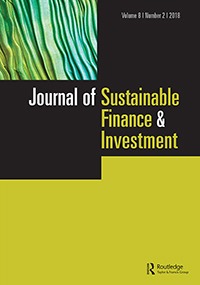

Farmers are highly dependent on stocks of natural capital, and lenders are in turn exposed to natural capital through their loans to farmers. However, the traditional process for assessing a farmer’s credit risk relies primarily on historical financial data. Banks’ consideration of environmental factors tends to be limited to major risks such as contaminated land liabilities, and to large project and corporate finance, as opposed to the smaller loans typical of the Australian agricultural sector. The relevant risks and dependencies for agriculture vary by sub-sector and geography, and there is a lack of standardised methodologies and evidence to support risk assessment. We provide an evidence base to support natural capital risk assessment for a single sub-sector of Australian agriculture – wheat farming. We show that such an assessment is possible, with a combination of quantitative and qualitative inputs, but the complexity and interconnectedness of natural capital processes is a challenge, particularly for soil health.
Book Chapters
Cojoianu, T.F., Hoepner, A.G.F, Lin, Y., Vu, A. 2023. Net-Zero Asset Owner Alliance Climate Voting Transparency and Benchmarking. Investment Management, Stewardship and Sustainability. ISBN: 9781509953752
Wójcik, D. and Cojoianu, T.F., 2018. A Global Overview from a Geographical Perspective. International Financial Centres after the Global Financial Crisis and Brexit, OUP, p.207.International readership – launched at the British Academy on the 17th of September 2018.
